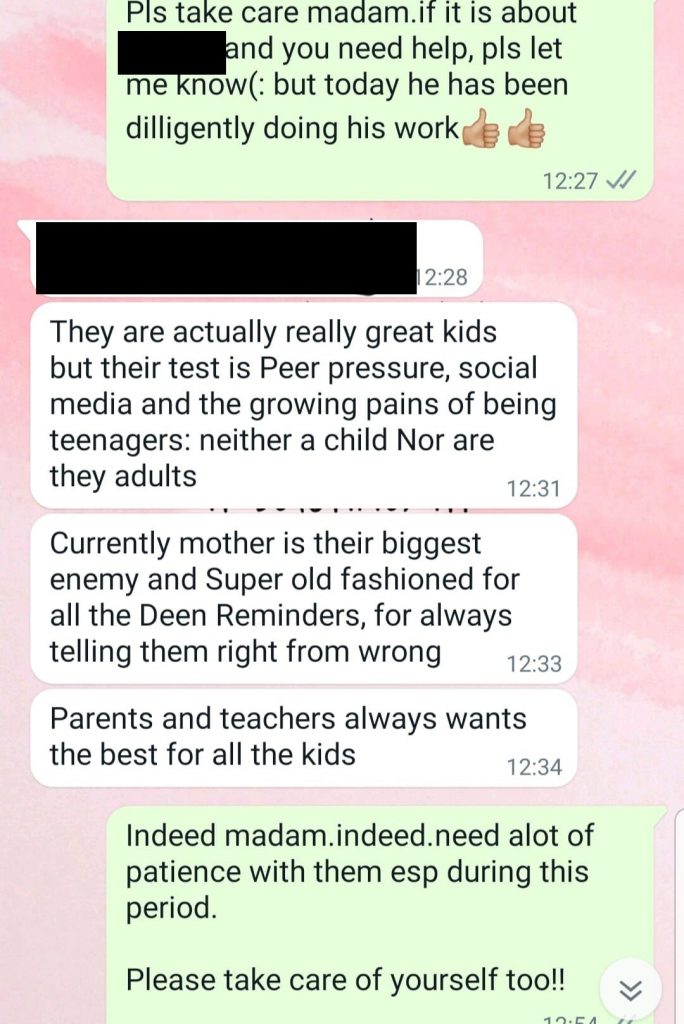Top image: MChe Lee/Unsplash
All names have been changed.
“I remember that week of the school’s end-of-year examinations as the worst marking week I’ve had in a while. A teacher in our already lean staffing count had just left, and I was exhausted from all the marking,” recalls Ms Teo, 52, who teaches Art in a Secondary school.
“But that afternoon, I received a delivery of desserts. It was from a parent of a student from my form class who thanked me for being patient with her child. I don’t even teach him any academic subjects,” she continues.
ADVERTISEMENT
Ms Teo was left in awe by that parent’s timely thoughtfulness. To her, it’s the consideration that comes from the heart of these parents that help make their trying job more manageable. At least emotionally.
Ms Teo remembers this incident fondly because most times, parents contact her over the most menial thing—like homework. Some even message her past work hours and expect her to respond instantly.
“It does take a toll because the line between my work and my life is blurred. I can’t just shut off.”
The job of teachers is rigorous and mentally exhausting. In his parliament speech earlier in September, Minister of Education Chan Chun Sing addressed the ubiquity of parents adding to a teacher’s already strained workload.
“To then load them with committee work, non-teaching-related duties, and meetings as well as constant, non-stop WhatsApp messages from multiple chat groups are unwise and untenable,” the minister reiterates.
So while the common narrative centres heavily on overbearing parents, what about the nicer ones? In a sea of unreasonable mothers and fathers, they’re easier to find than we initially thought.
Nice Parents? Where?
The definition of niceness differs, but it’s generally indisputable among teachers.
“Parents who are generally understanding and receptive of teachers when we do our jobs—be it discipline or academic matters—are nice parents,” Ms Farah, 31, explains. She has taught Malay in a secondary school since 2015.
“They don’t bother us that much,” she laughs.
“But niceness also means that if a student needs help from both the school and their parents, the parents are usually more hands-on, working hand-in-hand with the teacher.”
Other than receptivity and collaboration, respecting teachers as a figure of authority to their children is also appreciated.
“They trust your judgment and don’t question how you do things,” Ms Teo remarks. “That’s very important.”
Still, the icing on the cake for teachers is receiving genuine appreciation from parents.
“Some go the extra mile to get to know you. I have parents of students who graduated years ago still sending me well wishes every Hari Raya, Teacher’s Day, and keeping me updated with their child’s lives,” Ms Farah says.

Are Parents Less Nice Today?
As parenting trends evolve to keep up with modern expectations, so too have definitions of ‘niceness’ between parents and teachers.
ADVERTISEMENT
Still, while teachers’ expectations have seen little to no change, what teachers fear most today is the amplification of minute mistakes in every communication channel. Especially now that everything is a mere on-screen tap away.
“Every time I give my students instructions over Google classroom, I need to double down and ensure everything is perfect. I fear that potential small mistakes would be highly scrutinised and result in complaints going to principals and MOE, without even notifying me,” Ms Farah explains.
The unkindness we see in some parents also extends to an era where there’s an erosion of values of respect towards teachers.
“Parents intervene, judge, and are overbearing more often today because they no longer see teachers as the arbiter of authority, unlike in the past,” adds Mdm Chua, 47, a History teacher who has been teaching in different secondary schools.
“But there’s certainly less respect for the teaching profession now than when I started eighteen years ago.”
Yet the paradox is that their unkindness stems from wanting the best for their kids. It’s the same thing all parents (nice or not) desire.
The difference is the path they take. One chooses to be demanding and controlling, while the other walks the road of kindness and consideration.

The Transactionality of Niceness
While being nice is an individual, innate characteristic and should be no less of a default, the high stakes of academics often result in parents exerting unreasonable expectations on teachers.
This begs the uncomfortable question: Does the niceness of parents hinge on a teacher’s ability to deliver?
“Nowadays, more parents are protective over their children, intervening when they disagree with our way of teaching or disciplining students. Still, most generally listen to teachers’ feedback and understand, to help their child do their best,” says Ms Teo.
“I’ve had a parent who called me to question my decision on giving her Secondary 2 child, who’s aiming to take Art as an O-Level subject, a less than desirable grade for his art paper.”
The parent was adamant that he deserved a better grade. But once Ms Teo explained where he was lacking and how she would help him improve, the parent trusted her and was very nice whenever they communicated.
“But I know they’re nice to me not because they stand in our shoes and are mostly concerned about our wellbeing. Rather, they cooperate with us, so their children can get good grades,” reflects Ms Teo.
“It’s all quite transactional.”
Beyond the expectations of teachers to help their children succeed academically, some parents also require teachers to take on roles that parents may not be able to fulfil, such as imparting moral values and parenting.
Ms Farah, who often had students from single-parent families, spent more time with these students, helping them with disciplinary issues and personal family matters.
“Since these parents are busy and are often unable to parent their child, they genuinely appreciate me for being a maternal figure to their child.”

Socioeconomic Spectrums
“From my experience, parents of students from Normal Academic (NA) and Normal Technical (NT) streams are usually nicer to us because they trust us as the beacon of knowledge and authority,” Ms Teo observes.
She posits that this could be due to how some of these parents are less educated themselves. Hence, they’re less well-versed with the academic and social requirements of schools.
“They also don’t really understand their children,” she continues, “and hope teachers can discipline them.”
Due to life circumstances, parents on the lower end of the socioeconomic spectrum often spend more time and energy working to ensure the family is financially stable.
This leaves them less time to understand the aspects of their child’s education, such as their studying patterns, academic performance, behaviour, and their daily habits at home which could spill over into school.
And when these parents have less time to parent, naturally, they rely on teachers to do it for them.

Going The Extra Mile
Like Ms Teo, Ms Farah has had to take on quite a parenting role for her students. In taking on that role, she has met parents who, while at a loss on how they can help their children do try their best to understand and cooperate with teachers.
She shares an incident where the parents of a student from her first graduating batch took the trouble to make an hour-long trek down to her school across the island to thank her personally for her efforts.
“I once had a student who was from the NT stream. His family wasn’t well-off, and his parents had separated, so they didn’t have time to watch over him. He played truant quite often, and I did house visits frequently whenever he skipped school.”
Thankfully, his parents served as a steady and reliable source of support when she needed to reach out to her student. Unlike many avoidant parents, they trudged through difficulties and actively helped to communicate with him.
“With his parents’ help locating his whereabouts, I would make arrangements to call him every day after lessons, no matter how busy I was, to ensure he was safe,” Ms Farah shares.
“From booking a taxi for him to come to school to encouraging him to attend on his own accord, it was an arduous journey watching him motivate and discipline himself.”
Until today, the student’s parents keep in touch with her to keep her updated with their child’s life goals and progress. It’s their sincerity that genuinely touched her and kept her going.

What Educated Parents Bring to the Table
Most of the teachers RICE spoke to agreed, to varying degrees, that parents with children from the Express academic stream are more prone to intervening with how teachers teach. They’re more invasive, some share.
“Many are relatively higher educated than parents of children from other academic streams and tend to know more about what’s going on in school. Some parents think their children are kind and intelligent and deserve better grades. Hence they question our teaching ability and judgment,” says Ms Teo.
On the flipside, they are also generally good to be reasoned with.
Ms Teo says, “I once had to file a discipline case for my student, from his repeated incidents of causing trouble in class. He would, without fail, pour the ink of his pen into his classmates’ bottles, causing alarm in the whole class.”
“He’s quite pampered by his father, so when I called his mother to inform her about his discipline case.” And athough the mother was taken aback by the punishment, she eventually understood the difficulty Ms Teo faced in handling this student and agreed with the punishment.
“I feel that her understanding relates to her parenting style. While she holds a high position at work, she’s a firm mother who spares no rods when her child misbehaves. I guess that’s why she trusted me and believed in my judgment.”
Still, that’s not to say that parents of children from the Express stream or parents from a higher socioeconomic status are incapable of being nice.
These parents, too, show appreciation for teachers’ hard work. However, niceness for these two groups of parents is more malleable and tends to change quickly based on situations rather than from an honest and genuine parent-teacher relationship.
Thankfully, Parents Are Nicer Than We Think

Generally, many share the binary notion that parents are either nice or unreasonable without room for nuance. Constant communication between parents and teachers has often been cited as a solution to placate unreasonable parents and improve their relationship with teachers.
But in actuality, many parents are reasonable in what they expect from teachers. Many don’t demand incessant updates about their children. The few who do, the teachers tell me, are the black sheep of the bunch. For the teachers, timely communication, not frequency, is key to building trust and understanding in a two-way relationship.
Ms Farah explains. “We’re trying our best to change the negative stereotype that communication between parents and teachers only happens when teachers complain about students. So we start by giving parents updates when their child does well in tests, shows good conduct, or makes improvement.”
“It may not be huge milestones, but the recognition of the students’ effort counts to parents, and they are actually very grateful,” Mdm Chua offers.
As for teachers, it’s about recognising that they are human.
“By being nice and trusting, parents reassure us that we are on the right track in guiding our students,” chimes Ms Teo. “This helps because when a parent is understanding, I have the freeway to help the student without questioning myself at every step.”
Parents’ acts of appreciation go beyond gifts, as they show their understanding of the difficulty of the teaching profession.
“Many of them are mindful of our hectic periods, treating us with food like snacks and cakes during the marking period to keep our spirits up. This reveals their thoughtfulness and respect for us as teachers,” says Mdm Chua.
Thankfully, niceness in parents is still common. While it may be transactional to some extent, more often than not, for many parents, it comes from the heart.
And in the evolving society, they would continue to be influenced by societal circumstances. Nice parents, no doubt, exist—they just need to be louder than the overbearing ones.


